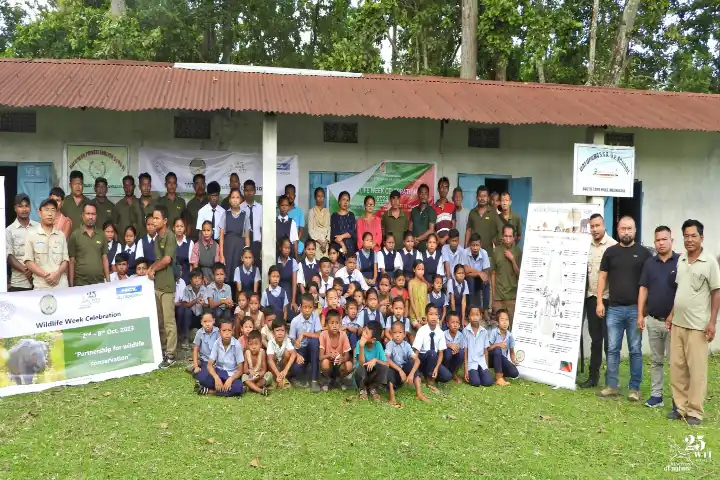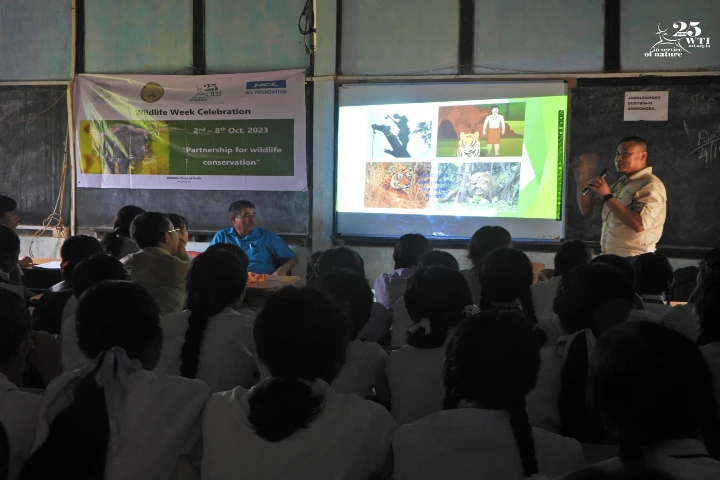

Students of the Dalupara SSA UP School who took part in the activities arranged during the National Wildlife Week
Garo Hills in Meghalaya was the scene of a plethora of activities during the National Wildlife Week celebrated in India from October 2 to 8 every year. The aim of these programmes was to raise awareness about wildlife conservation in the region and also honour the area’s biodiversity.
The celebrations were led by the Wildlife Trust of India in partnership with the State Forest Department, the Garo Hills Autonomous District Council, HCL Foundation and World Land Trust and they were hosted in villages across the South Garo Hills to foster inclusivity and collective action for wildlife conservation.


The celebrations started on October 3 in Dalupara village which is incidentally located near the India-Bangladesh border. A series of activities were arranged for students from Dalupara SSA UP School and Pokirgona Upper Primary School in which they actively participated. These included drawing and quiz competitions, documentary screenings and a cleanliness drive.
The events saw more than 100 people who included the local community, joining hands to ensure its success.
The next day, more than 500 students of Baghmara Government Higher Secondary School participated in essay writing and quiz competitions. Apart from testing their skills, the children were also shown a presentation on birds and mammals of Garo Hills.
They were imparted vital information and knowledge about the do’s and don’ts of encountering wild elephants besides being educated about human-snake conflicts and the appropriate measures to take in such circumstances.
The winners of the essay writing and quiz competitions received certificates from the Office of Director of Balpakram National Park.
On October 5, the NWW celebrations moved to Jetra village which is located at the western end of south Garo Hills. Here the WTI team hosted football matches to spread awareness about wildlife conservation. The event saw 80 footballers from four villages participating and there were 200 spectators to watch the proceedings. The final football match was held on October 6 with a large crowd enjoying the game.
The Garo Hills which forms part of the Indo-Burmese biodiversity hotspot and the Garo Hills Conservation Area is vying to become a World Heritage Site. It is also a part of the Garo Hills Elephant Reserve, so it is necessary to conserve the rich biodiversity of the region.
Sharing his thoughts about the NWW celebrations, Sandeep Kumar Tiwari, Chief of Conservation, WTI said: “Community-based conservation is the cornerstone of fostering coexistence and driving meaningful change. The interactions during Wildlife Week have played a crucial role in nurturing a sense of responsibility within the local community, inspiring a collective commitment to protect and coexist with our natural world.”
Prime Minister Narendra Modi had a "fruitful conversation" with Finnish President Alexander Stubb on Wednesday…
US Vice President JD Vance is scheduled to visit India next week. He will meet…
In a first, Indian Railways has installed an ATM on a trial basis -- on…
Commerce Minister Piyush Goyal met a delegation from Elon Musk-owned satellite internet services company Starlink.…
The United States has enacted restrictions on the export of Nvidia's H20 chips to China,…
BusinessWire India QpiAI, a leader in quantum computing and generative AI, announced its First Quantum…